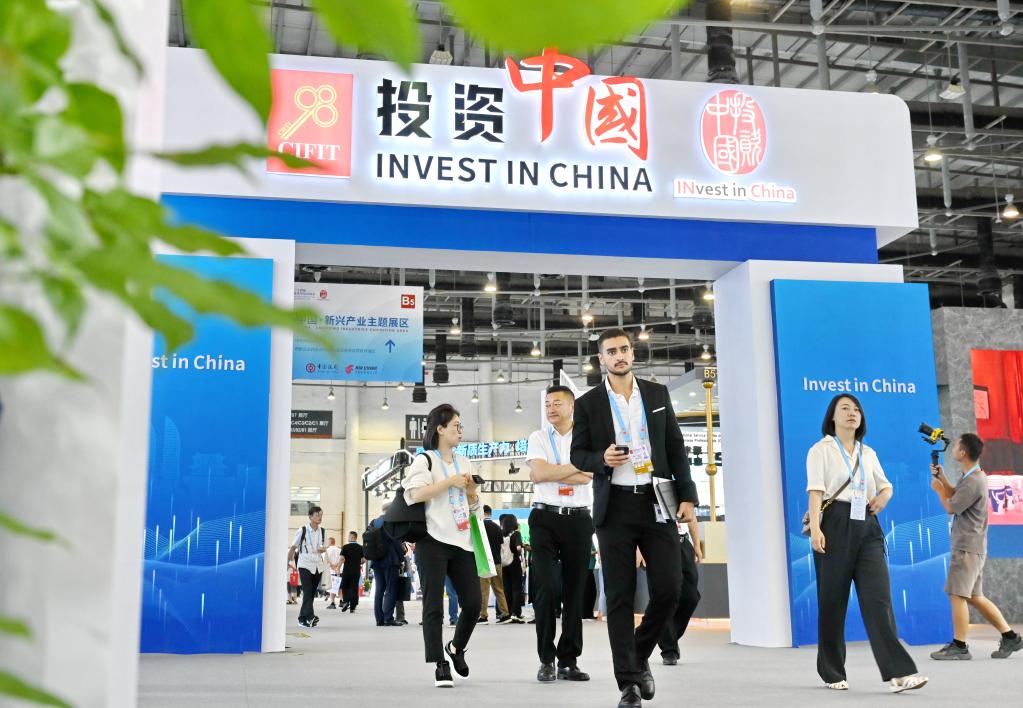
 0 Comment(s)
0 Comment(s) Print
Print E-mail Xinhua, April 2, 2025
E-mail Xinhua, April 2, 2025

Merchants visit the "Invest in China" area of the 24th China International Fair for Investment and Trade in Xiamen, southeast China's Fujian Province, Sept. 8, 2024. [Photo/Xinhua]
Against the backdrop of geopolitical tensions and growing waves of trade protectionism, foreign enterprises are doubling down on their commitment to China due to the country's economic resilience and innovation-driven growth.
A surge in high-profile investments and deepening strategic partnerships reflects a growing consensus: engagement with China remains a path to mutual gain.
Recent surveys underscore the sustained confidence among global investors, as the latest surveys show that 76 percent of British businesses operating in China plan to maintain or expand their investment. Similarly, 70 percent of U.S. consumer firms are eyeing expansion in 2025, while an overwhelming 92 percent of German companies intend to continue operations in the country.
Executives from major multinational corporations are making frequent visits to China, exploring new opportunities and reaffirming their long-term strategies.
Apple's Tim Cook pledged 30 million yuan (about 4.18 million U.S. dollars) to Zhejiang University to support China's next generation of developers, while COO Jeff Williams visited the company's supplier Goertek in east China's Shandong Province and praised its advanced manufacturing.
Biopharmaceutical giant AstraZeneca signed a landmark agreement to invest 2.5 billion U.S. dollars in Beijing over the next five years. German carmaker Mercedes-Benz committed over 14 billion yuan to strengthen its foothold in China. French healthcare multinational Sanofi also unveiled its largest single investment in China -- a 1-billion-euro production base in Beijing. Such moves align with China's push for high-standard opening-up and its efforts to streamline foreign investment approvals.
"China is in a phase of very rapid development, and German companies have seized opportunities, with most being quite successful here and satisfied with the results," said Hermann Simon, a German management expert who had led a delegation of over 20 German "hidden champions," small and medium-sized companies with strong market niches, to east China's Anhui Province to explore new partnerships.
According to Simon, multinational corporations must identify the optimal global location for each business activity. In many cases, China remains the top choice, offering unparalleled comprehensive capabilities across sectors.
Global investors' interest in China's capital markets is also rebounding. A recent report by Goldman Sachs noted that overseas participation in China's stock market has climbed to its highest level in nearly four years, a sign of renewed enthusiasm for Chinese equities amid ongoing economic adjustments.
"Investing in China is a two-way street for shared success," said Liu Qiao, dean of the Guanghua School of Management at Peking University, citing China's high-standard opening-up policies, robust supply chains and an innovation-driven ecosystem. The influx of advanced technologies, talent and capital is expected to accelerate China's industrial upgrading.
From scale expansion to structural upgrading, multinational corporations are ramping up investment in technology-intensive sectors, including the new energy, smart manufacturing and healthcare sectors, a trend aligned with China's strategic pivot toward cultivating "new quality productive forces." This sectoral shift is an inevitable trend resulting from China's accelerated industrial transformation and upgrading, combined with the restructuring of the global supply chain, according to Liu.
Official data showed that in 2024, China's hi-tech manufacturing sector attracted 96.29 billion yuan, 11.7 percent of the nation's total foreign direct investment (FDI) inflows. FDI inflows soared 98.7 percent year on year in the medical equipment and instrument manufacturing sector, 40.8 percent in the professional technical services sector and 21.9 percent in the computer and office equipment manufacturing sector.
China has developed sound regulations, policies and procedures for foreign investment, promoted trade and investment liberalization and facilitation, and made active efforts to foster a first-class business environment that is market-oriented, law-based and internationalized. The world's second-largest economy has created a powerful magnet for foreign investment, while multinationals fuel industrial upgrades with tech capital.
Analysts note that the growing commitment of foreign investors, particularly to emerging and future-oriented industries, is helping to ensure that economic globalization is inclusive and beneficial for all.